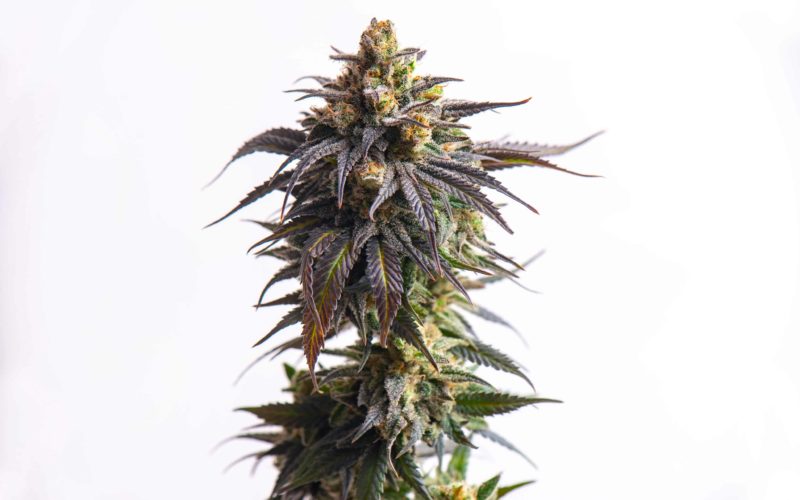Government
Court Rules Oklahoma Won’t Vote On Legalizing Pot in November

Oklahoma residents will have to wait up to two years to vote on a measure to legalize adult-use cannabis after the state Supreme Court denied a petition to include the question on the ballot for the November election.
The Oklahoma Supreme Court ruled on Wednesday that voters will get to decide on a ballot proposal to legalize recreational marijuana, but not until after this year’s general election in November. The state’s highest court rejected an appeal from the group Oklahomans for Sensible Marijuana Laws that would have required the State Election Board to include State Question 820 on the ballot for this year’s vote.
“There is no way to mandate the inclusion of SQ820 on the November 2022 general election ballot,” Justice Douglas Combs wrote in the majority opinion. “SQ820 will be voted upon by the people of Oklahoma, albeit either at the next general election following November 8, 2022, or at a special election set by the Governor or the Legislature.”
In July, Oklahomans for Sensible Marijuana Laws submitted petitions with signatures from more than 164,000 voters in favor of the legalization initiative, exceeding the number required to qualify for the ballot by more than 70,000 signatures. But the secretary of state’s office, which was using a new system to verify signatures, took far longer to certify the signatures than in previous elections, leaving too little time to include the question on this fall’s ballot, according to election officials.
Jeffrey Cartmell, counselor to the secretary of state, said the service provided by the third-party vendor to check signatures was possibly the first “true signature verification process” ever used by the state.
“This new process differs significantly from the historical practice of merely counting the number of individuals who signed the petition without regard for their voter registration status,” Cartmell wrote in a statement to News 9.
The Supreme Court also issued a decision on legal challenges to State Question 820 on Wednesday, ruling against two petitions that sought changes in the measure’s ballot title and summary. The justices also denied requests for rehearings on two challenges to the signature gathering process that the court had already rejected.
“It is disappointing that a few people with their own political interests were able to use the process to prevent voters from voting on this in November,” campaign director Michelle Tilley said in a statement. “However, we cannot lose sight of how far we have come. This is a big deal. Now the petition phase is finished, and Oklahomans will be voting to legalize recreational marijuana here, and we can soon realize all the benefits it will bring to our state.”
State Question 820 Would Legalize Rec Weed in Oklahoma
If the proposal is eventually passed, State Question 820 would legalize cannabis for adults 21 and older. The ballot initiative would also task the state’s existing Oklahoma Medical Marijuana Authority with drafting and implementing rules to regulate the new recreational cannabis industry. The measure also includes provisions to allow those with past convictions for some marijuana offenses to petition the courts to reverse their convictions and have their criminal record expunged.
State Question 820 would set a 15% tax on sales of recreational marijuana, more than double the 7% tax rate levied on sales of medical cannabis. Taxes generated by the sale of recreational pot would be divided among the state’s General Revenue Fund, local governments that allow licensed adult-use cannabis businesses to operate in their jurisdiction, the state court system, school districts, and drug treatment programs.
With the Supreme Court’s decision, State Question 820 will not be presented to the electorate until the 2024 general election, unless a special election is called by Republican Governor Kevin Stitt, who has expressed opposition to the proposal. But he has also said that the nation’s patchwork policy of cannabis legalization and prohibition has become problematic.
“Do I wish that the feds would pass legalized marijuana? Yes. I think that would solve a lot of issues from all these different states,” Stitt recently told The Associated Press. “But in our state, just trying to protect our state right now, I don’t think it would be good for Oklahoma.”
Arshad Lasi, CEO of Oklahoma licensed medical marijuana company The Nirvana Group, said that news of the Supreme Court’s decision “is disappointing because the industry and consumers here alike were optimistic that recreational marijuana would make it onto the ballot and be voted into law.”
“This setback may make things especially difficult for smaller businesses, who will likely continue to face challenges navigating this saturated market but growing market,” Lasi said in an email to High Times. “We are optimistic that another opportunity for adult-use marijuana may be possible via a special election in the coming months. However, if that doesn’t prevail we may not have another chance for two years.”
Source: https://hightimes.com/news/court-rules-oklahoma-wont-vote-on-legalizing-pot-in-november/
Business
New Mexico cannabis operator fined, loses license for alleged BioTrack fraud

New Mexico regulators fined a cannabis operator nearly $300,000 and revoked its license after the company allegedly created fake reports in the state’s traceability software.
The New Mexico Cannabis Control Division (CCD) accused marijuana manufacturer and retailer Golden Roots of 11 violations, according to Albuquerque Business First.
Golden Roots operates the The Cannabis Revolution Dispensary.
The majority of the violations are related to the Albuquerque company’s improper use of BioTrack, which has been New Mexico’s track-and-trace vendor since 2015.
The CCD alleges Golden Roots reported marijuana production only two months after it had received its vertically integrated license, according to Albuquerque Business First.
Because cannabis takes longer than two months to be cultivated, the CCD was suspicious of the report.
After inspecting the company’s premises, the CCD alleged Golden Roots reported cultivation, transportation and sales in BioTrack but wasn’t able to provide officers who inspected the site evidence that the operator was cultivating cannabis.
In April, the CCD revoked Golden Roots’ license and issued a $10,000 fine, according to the news outlet.
The company requested a hearing, which the regulator scheduled for Sept. 1.
At the hearing, the CCD testified that the company’s dried-cannabis weights in BioTrack were suspicious because they didn’t seem to accurately reflect how much weight marijuana loses as it dries.
Company employees also poorly accounted for why they were making adjustments in the system of up to 24 pounds of cannabis, making comments such as “bad” or “mistake” in the software, Albuquerque Business First reported.
Golden Roots was fined $298,972.05 – the amount regulators allege the company made selling products that weren’t properly accounted for in BioTrack.
The CCD has been cracking down on cannabis operators accused of selling products procured from out-of-state or not grown legally:
- Regulators alleged in August that Albuquerque dispensary Sawmill Sweet Leaf sold out-of-state products and didn’t have a license for extraction.
- Paradise Exotics Distro lost its license in July after regulators alleged the company sold products made in California.
Golden Roots was the first alleged rulebreaker in New Mexico to be asked to pay a large fine.
Source: https://mjbizdaily.com/new-mexico-cannabis-operator-fined-loses-license-for-alleged-biotrack-fraud/
Business
Marijuana companies suing US attorney general in federal prohibition challenge

Four marijuana companies, including a multistate operator, have filed a lawsuit against U.S. Attorney General Merrick Garland in which they allege the federal MJ prohibition under the Controlled Substances Act is no longer constitutional.
According to the complaint, filed Thursday in U.S. District Court in Massachusetts, retailer Canna Provisions, Treevit delivery service CEO Gyasi Sellers, cultivator Wiseacre Farm and MSO Verano Holdings Corp. are all harmed by “the federal government’s unconstitutional ban on cultivating, manufacturing, distributing, or possessing intrastate marijuana.”
Verano is headquartered in Chicago but has operations in Massachusetts; the other three operators are based in Massachusetts.
The lawsuit seeks a ruling that the “Controlled Substances Act is unconstitutional as applied to the intrastate cultivation, manufacture, possession, and distribution of marijuana pursuant to state law.”
The companies want the case to go before the U.S. Supreme Court.
They hired prominent law firm Boies Schiller Flexner to represent them.
The New York-based firm’s principal is David Boies, whose former clients include Microsoft, former presidential candidate Al Gore and Elizabeth Holmes’ disgraced startup Theranos.
Similar challenges to the federal Controlled Substances Act (CSA) have failed.
One such challenge led to a landmark Supreme Court decision in 2005.
In Gonzalez vs. Raich, the highest court in the United States ruled in a 6-3 decision that the commerce clause of the U.S. Constitution gave Congress the power to outlaw marijuana federally, even though state laws allow the cultivation and sale of cannabis.
In the 18 years since that ruling, 23 states and the District of Columbia have legalized adult-use marijuana and the federal government has allowed a multibillion-dollar cannabis industry to thrive.
Since both Congress and the U.S. Department of Justice, currently headed by Garland, have declined to intervene in state-licensed marijuana markets, the key facts that led to the Supreme Court’s 2005 ruling “no longer apply,” Boies said in a statement Thursday.
“The Supreme Court has since made clear that the federal government lacks the authority to regulate purely intrastate commerce,” Boies said.
“Moreover, the facts on which those precedents are based are no longer true.”
Verano President Darren Weiss said in a statement the company is “prepared to bring this case all the way to the Supreme Court in order to align federal law with how Congress has acted for years.”
While the Biden administration’s push to reschedule marijuana would help solve marijuana operators’ federal tax woes, neither rescheduling nor modest Congressional reforms such as the SAFER Banking Act “solve the fundamental issue,” Weiss added.
“The application of the CSA to lawful state-run cannabis business is an unconstitutional overreach on state sovereignty that has led to decades of harm, failed businesses, lost jobs, and unsafe working conditions.”
Business
Alabama to make another attempt Dec. 1 to award medical cannabis licenses

Alabama regulators are targeting Dec. 1 to award the first batch of medical cannabis business licenses after the agency’s first two attempts were scrapped because of scoring errors and litigation.
The first licenses will be awarded to individual cultivators, delivery providers, processors, dispensaries and state testing labs, according to the Alabama Medical Cannabis Commission (AMCC).
Then, on Dec. 12, the AMCC will award licenses for vertically integrated operations, a designation set primarily for multistate operators.
Licenses are expected to be handed out 28 days after they have been awarded, so MMJ production could begin in early January, according to the Alabama Daily News.
That means MMJ products could be available for patients around early March, an AMCC spokesperson told the media outlet.
Regulators initially awarded 21 business licenses in June, only to void them after applicants alleged inconsistencies with how the applications were scored.
Then, in August, the state awarded 24 different licenses – 19 went to June recipients – only to reverse themselves again and scratch those licenses after spurned applicants filed lawsuits.
A state judge dismissed a lawsuit filed by Chicago-based MSO Verano Holdings Corp., but another lawsuit is pending.
Source: https://mjbizdaily.com/alabama-plans-to-award-medical-cannabis-licenses-dec-1/
-

 Business2 years ago
Business2 years agoPot Odor Does Not Justify Probable Cause for Vehicle Searches, Minnesota Court Affirms
-

 Business2 years ago
Business2 years agoNew Mexico cannabis operator fined, loses license for alleged BioTrack fraud
-

 Business2 years ago
Business2 years agoAlabama to make another attempt Dec. 1 to award medical cannabis licenses
-

 Business2 years ago
Business2 years agoWashington State Pays Out $9.4 Million in Refunds Relating to Drug Convictions
-

 Business2 years ago
Business2 years agoMarijuana companies suing US attorney general in federal prohibition challenge
-

 Business2 years ago
Business2 years agoLegal Marijuana Handed A Nothing Burger From NY State
-

 Business2 years ago
Business2 years agoCan Cannabis Help Seasonal Depression
-

 Blogs2 years ago
Blogs2 years agoCannabis Art Is Flourishing On Etsy













